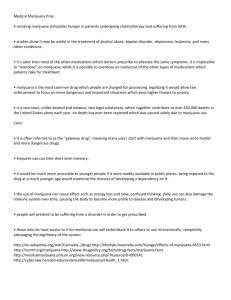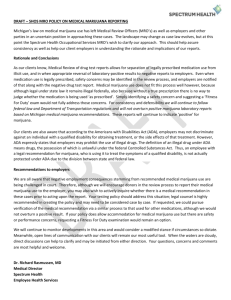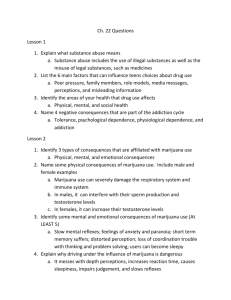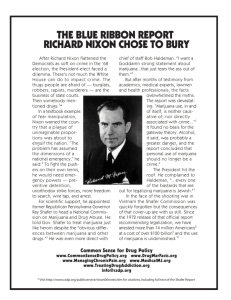Legalization of Marijuana: What It Means for
advertisement
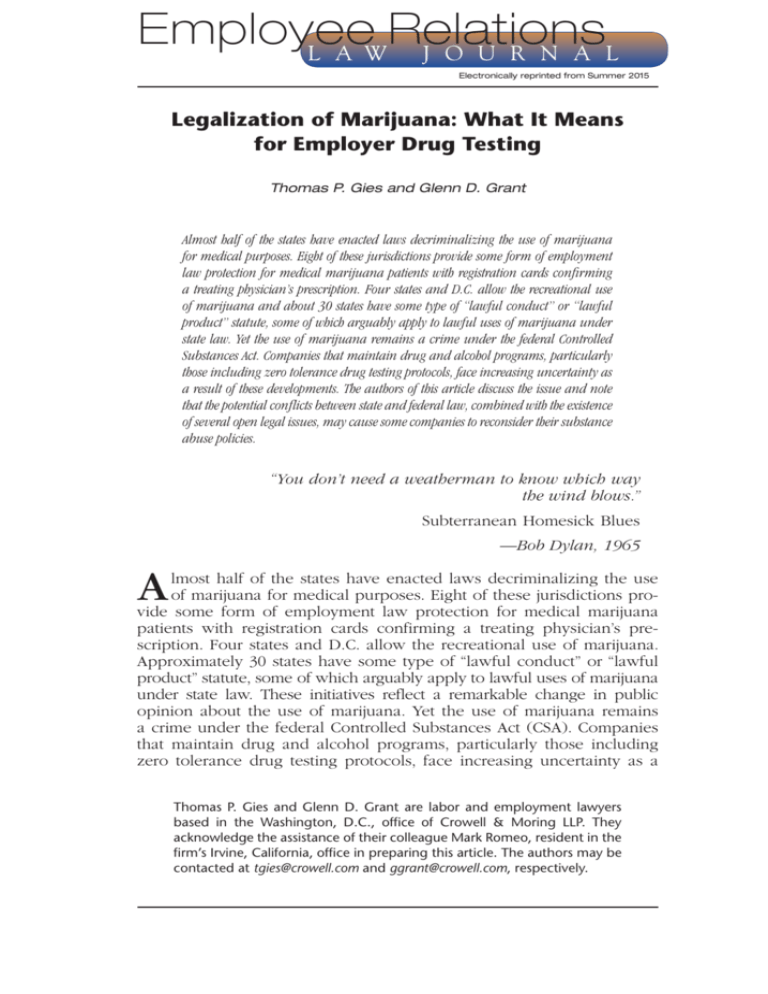
Employee Relations L A W J O U R N A L Electronically reprinted from Summer 2015 Legalization of Marijuana: What It Means for Employer Drug Testing Thomas P. Gies and Glenn D. Grant Almost half of the states have enacted laws decriminalizing the use of marijuana for medical purposes. Eight of these jurisdictions provide some form of employment law protection for medical marijuana patients with registration cards confirming a treating physician’s prescription. Four states and D.C. allow the recreational use of marijuana and about 30 states have some type of “lawful conduct” or “lawful product” statute, some of which arguably apply to lawful uses of marijuana under state law. Yet the use of marijuana remains a crime under the federal Controlled Substances Act. Companies that maintain drug and alcohol programs, particularly those including zero tolerance drug testing protocols, face increasing uncertainty as a result of these developments. The authors of this article discuss the issue and note that the potential conflicts between state and federal law, combined with the existence of several open legal issues, may cause some companies to reconsider their substance abuse policies. “You don’t need a weatherman to know which way the wind blows.” Subterranean Homesick Blues —Bob Dylan, 1965 A lmost half of the states have enacted laws decriminalizing the use of marijuana for medical purposes. Eight of these jurisdictions provide some form of employment law protection for medical marijuana patients with registration cards confirming a treating physician’s prescription. Four states and D.C. allow the recreational use of marijuana. Approximately 30 states have some type of “lawful conduct” or “lawful product” statute, some of which arguably apply to lawful uses of marijuana under state law. These initiatives reflect a remarkable change in public opinion about the use of marijuana. Yet the use of marijuana remains a crime under the federal Controlled Substances Act (CSA). Companies that maintain drug and alcohol programs, particularly those including zero tolerance drug testing protocols, face increasing uncertainty as a Thomas P. Gies and Glenn D. Grant are labor and employment lawyers based in the Washington, D.C., office of Crowell & Moring LLP. They acknowledge the assistance of their colleague Mark Romeo, resident in the firm’s Irvine, California, office in preparing this article. The authors may be contacted at tgies@crowell.com and ggrant@crowell.com, respectively. Legalization of Marijuana result of these developments. Potential conflicts between state and federal law, combined with the existence of several open legal issues, may cause some companies to reconsider their substance abuse policies. STATE LEGALIZATION LAWS With last year’s passage of New York’s Compassionate Care Act, 23 states and the District of Columbia have passed legislation legalizing marijuana for medical use.1 In November of last year, voters in Alaska, Oregon, and the District of Columbia approved legislative initiatives legalizing recreational use of marijuana, joining Colorado and Washington. Eight states have enacted legislation that provides varying degrees of employment-related protections to medical marijuana patients.2 Minnesota’s Medical Cannabis Act, enacted in May 2014 of last year, is illustrative. Section 12(subd. 3)(c) of the Act provides: Unless a failure to do so would violate federal law or regulations or cause an employer to lose a monetary or licensing-related benefit under federal law or regulations, an employer may not discriminate against a person in hiring, termination, or any term or condition of employment, or otherwise penalize a person, if the discrimination is based upon either of the following: (1) the person’s status as a patient enrolled in the registry program under [the Act]; or (2) a patient’s positive drug test for cannabis components or metabolites, unless the patient used, possessed, or was impaired by medical cannabis on the premises of the place of employment or during the hours of employment.3 The Minnesota statute is modeled on a Delaware law, enacted in May 2011 and one of the first medical marijuana statutes to include explicit employment law protections for registered users. Delaware’s statute prevents employers from discriminating against an employee “in hiring, termination, or any term or condition of employment, or otherwise penaliz[ing] a person” for his “status as a cardholder.”4 Like the Minnesota statute, the Delaware law also prohibits adverse employment action because of a “positive drug test for marijuana components or metabolites.”5 By contrast, the Maine and Rhode Island statutes provide no such explicit protection. Most of the eight states do not define the term “impairment,” for purposes of determining when a registered user would forfeit statutory protections by being impaired at the worksite. The Illinois statute defines impairment, stating that an employer may consider a lawful medical marijuana user as being impaired: Legalization of Marijuana [W]hen he or she manifests specific, articulable symptoms while working that decrease or lessen his or her performance of the duties or tasks of the employee’s job position, including symptoms of the employee’s speech, physical dexterity, agility, coordination, demeanor, irrational or unusual behavior, negligence or carelessness in operating equipment or machinery, disregard for the safety of the employee or others, or involvement in an accident that results in serious damage to equipment or property, disruption of a production or manufacturing process, or carelessness that results in any injury to the employee or others.6 This definition gives Illinois employers significant latitude to discipline employees for workplace abuse of medical marijuana, especially since the state says no claim may be brought against an employer based on its “good faith belief” that an employee was impaired while working.7 Perhaps the most important feature of these state laws is that they do not authorize either worksite use of marijuana or being impaired at work. While each law has its own nuances, many of them specify that employers are not required to permit individuals to use marijuana at a worksite or permit employees to work while impaired by or under the influence of marijuana. For example, Illinois’s statute, while prohibiting employment discrimination based on the status of being a registered medical marijuana user, expressly states that the law does not “prohibit an employer from enforcing a policy concerning drug testing, zerotolerance, or a drug free workplace provided the policy is applied in a nondiscriminatory manner.”8 Along with a number of other protections for employers, the Illinois law also expressly permits employers to adopt reasonable regulations concerning the consumption, storage, or timekeeping requirements for qualifying patients related to the use of medical marijuana, and to discipline a qualifying patient for violating a workplace drug policy or for failing a drug test where that failure would place the employer in violation of federal law or cause the employer to lose a federal contract or funding.9 STATE LAWFUL CONDUCT LEGISLATION Approximately 30 states have enacted so-called “lawful conduct” or “lawful product” statutes. Many of the early lawful conduct laws where intended to protect tobacco smokers from discrimination at work and therefore prohibit discrimination based on an employee’s lawful use of consumable products outside of the workplace.10 Other state statutes are broader, prohibiting discrimination based on lawful activities engaged in by employees while they are off duty and not in the workplace.11 While these statutes vary in detail, many of them accord affirmative protections against various types of penalties for the exercise of rights permitted under state law. The Colorado Lawful Activities Statute is illustrative; Legalization of Marijuana it prohibits employers from terminating employment on the basis of a person’s lawful activity outside the workplace during nonworking hours.12 Similarly, Section 96(k) of California’s Labor Code authorizes the California’s Labor Commissioner to bring claims “for loss of wages as the result of demotion, suspension or discharge from employment for lawful conduct occurring during nonworking hours away from the employer’s premises.”13 It bears emphasis that, while these state laws prohibit discrimination based on an individual’s lawful, off-duty conduct, they do not specify whether the off-duty conduct at issue must be lawful under state law, federal law, or both, in order for the protections to apply. As explained below, these state laws are only one part of an increasingly complicated legal regime. APPLICABLE FEDERAL LAWS—A SOURCE OF CONFLICT? Marijuana remains an illegal drug under federal law. The CSA14 lists marijuana as a “Schedule One” unlawful drug.15 Although marijuana remains unlawful under federal law, the Obama administration has adopted a “non-enforcement” approach with respect to states that have enacted laws legalizing marijuana use. Consistent with that approach, the U.S. Department of Justice issued guidance in August 2013 indicating that federal prosecutors should not use their limited resources to prosecute personal marijuana use, particularly in states where such use is lawful under state law.16 The Justice Department reiterated that advice in February 2014.17 The Americans with Disabilities Act (ADA)18 protects qualified individuals with a disability from employment discrimination and requires employers to take affirmative action to accommodate disabled individuals. The ADA contains an explicit exclusion for individuals currently engaged in the “illegal use of drugs.”19 Although an individual who is a medical marijuana patient likely suffers from a medical condition that would constitute a disability under the ADA, the so-called “current use” exception is widely understood to mean that individuals engaged in the illegal use of drugs are not protected under the ADA.20 But, as discussed below, the law is far from settled as to the question of whether a medical marijuana user with a prescription issued by a licensed health care professional under authority of state law necessarily would be excluded from ADA protections. The Drug Free Workplace Act of 1988 (DFWA)21 obligates companies that hold government contracts to maintain a policy providing that use, distribution, or manufacture of a controlled substance in the workplace is unlawful. The DFWA also requires that covered employers make drug counseling available and advise employees that a penalty or participation in a drug abuse or rehabilitation program will be imposed if they are convicted of a drug-related offense in the workplace. Yet the DFWA Legalization of Marijuana does not require employee drug testing. Employers that decide not to engage in employee drug testing are not at risk of violating the DFWA and putting their government contracts in jeopardy. Courts and agencies have not addressed the question of whether a federal contractor is at risk of losing a government contractor if it decides to make an exception from a zero tolerance policy for a medical marijuana user. Federal law requires employee drug testing in certain circumstances. Since the 1970s, the U.S. Department of Transportation (DOT) has promulgated and enforced regulations that require drug testing (including testing for marijuana) for employees working in a variety of safety sensitive jobs.22 Last year, DOT reiterated its intention to make no change in its position on marijuana use, notwithstanding the passage of state recreational marijuana legalization laws.23 One of the few reasonably clear principles in this area is that employers covered by DOT regulations must continue to administer drug testing in a manner consistent with those regulations. THE CURRENT LEGAL LANDSCAPE The traditional view is that employers may discipline employees for marijuana use pursuant to a properly-promulgated substance abuse policy for the simple reason that marijuana use remains unlawful under federal law. Thus far, courts have resolved the conflict between the federal and state laws summarized above in favor of a private sector employer’s right to impose discipline for a positive drug test. For example, courts to date have rejected the argument that the ADA authorizes medical marijuana use prescribed by a professional health care provider and prohibits discrimination against individuals who engage in lawful use of medical marijuana under state law. In James v. City of Costa Mesa,24 the Ninth Circuit concluded that severely disabled individuals had no ADA Title II public accommodations claim against two California municipalities that decided to eliminate city-operated medical marijuana dispensaries. The court concluded that, even though California state law authorized medical marijuana use, the plaintiffs could not assert an ADA claim. The court reasoned that, because marijuana is unlawful under the CSA, the ADA could not be interpreted to authorize its use, irrespective of the state law provision at issue. The majority rejected plaintiff’s argument that the “licensed health care professional” clause of the ADA’s “current use” exception should extend to prescriptions for medical marijuana. The majority noted that its holding did not mean that individuals suffering from disabilities could never assert an ADA claim, noting that the “current use” exception is limited to adverse actions taken in response to use of an illegal drug. The court relied on EEOC guidance defining operative terms, including “disability,” under the ADA.25 Judge Berzon’s dissent argued forcefully that the majority had misinterpreted the relationship between the ADA and Legalization of Marijuana the CSA. She suggested that, in an ADA employment case, an individual who has been prescribed medical marijuana under state law might well be protected under the ADA if, notwithstanding its use, the individual was able to perform the critical functions of the job.26 Claims under state disability laws also have been rejected. In a decision widely viewed as a significant victory for employers, the California Supreme Court held, in Ross v. RagingWire Telecommunications, Inc.,27 that the termination of an employee for a positive drug test did not create a cause of action under California’s disability protection statute. The Oregon Supreme Court reached a similar conclusion in Emerald Steel Fabricators.28 There, the Oregon Supreme Court concluded that the state medical marijuana statute did not prevent the employer from terminating an employee who tested positive for marijuana use. The court emphasized that since marijuana is illegal under federal law, application of the state law was effectively preempted.29 Other courts have concluded that state marijuana legalization laws are limited to the world of criminal law and do not alter the employer’s right to administer a substance abuse policy that includes random testing. The Sixth Circuit’s opinion in Casius v. Wal-Mart is illustrative.30 There the court interpreted a Michigan statute legalizing medical marijuana use. The court concluded that the plaintiff, a cancer patient who was a licensed medical marijuana user and whose employment was terminated after a positive drug test, could not state a claim under the state law, because it made no reference to private employment rights.31 Litigation over enforcement of drug and alcohol policies, of course, is not a new phenomenon. Employers have wrestled with a variety of claims since the beginning of workplace drug and alcohol testing. For example, employers have faced challenges from union-represented employees who have challenged termination for positive drug tests. In Eastern Associated Coal Company v. UMWA,32 the Supreme Court held that an arbitrator did not violate “public policy” in ordering the return to work of a truck driver who tested positive for marijuana under the terms of a grievance procedure contained in a collective bargaining agreement. And various types of legal challenges to the administration of testing programs continue, even in situations in which the employer’s right to test is not contested directly.33 THE CASE OF THE SYMPATHETIC PLAINTIFF Coats v. Dish Network, LLC, a case pending before the Colorado Supreme Court, illustrates the conundrum facing employers in jurisdictions that have legalized marijuana use.34 The plaintiff in this case, Brandon Coats, is a 35-year-old man who is a paraplegic as a result of a serious automobile crash. Pursuant to Colorado’s medical marijuana law, Mr. Coats obtained a registration card and began receiving medical marijuana to treat serious chronic pain. Mr. Coats was employed in a Legalization of Marijuana call center operated by the satellite television provider Dish Network. He was fired after testing positive under his employer’s random drug testing policy, even though there was no evidence that he was ever impaired at work. The record indicates that Mr. Coats disclosed his medical condition to the employer, which refused to accommodate his situation. Mr. Coats then sued, arguing that the employer’s action violated Colorado’s Lawful Activities Statute35 because his medical marijuana use was lawful under Colorado’s medical marijuana law, which was passed as an amendment to the state constitution.36 The trial court granted the employer’s motion to dismiss, and the Colorado appellate court affirmed, in a 2-1 split decision. Both courts concluded that Coats’ medical marijuana use, while prescribed by a doctor and lawful under Colorado state law, remained unlawful under federal law. As a result, Mr. Coats was not engaged in “lawful activity” within the meaning of Colorado’s Lawful Activities Statute. The majority concluded that, for an activity to be covered under that statute, it must be lawful under both federal and state law. As the Coats case makes clear, medical marijuana patients living in states where medical marijuana is legal may face an impossible choice: continue their marijuana use to alleviate their debilitating medical condition, and put their livelihood at risk, or continue their employment without the benefit of medical marijuana and suffer chronic and at times excruciating pain. Indeed, following the September 30, 2014, oral argument before the Colorado Supreme Court, an attorney for Mr. Coats was quoted as saying that if his client loses, the state medical marijuana statute will end up only benefitting the unemployed.37 UNEMPLOYMENT BENEFITS IN MICHIGAN— ANOTHER STRAW IN THE WIND? In October of last year, in Braska v. Challenge Manufacturing Co., a Michigan state appellate court issued a ground-breaking decision involving eligibility for unemployment compensation benefits under a state medical marijuana law.38 The court held that an employee who has a registration identification card issued under the Michigan Medical Marihuana Act (MMMA) may collect unemployment benefits if he is fired for a positive marijuana test. In the typical situation, an individual fired for failing a drug test would be disqualified for unemployment benefits under Michigan law. The Braska court reasoned that the medical marijuana law preempted the state’s unemployment compensation statute in this circumstance, concluding that the denial of benefits constituted an “improper penalty for the medical use of marijuana” under the Michigan medical marijuana statute. As with many of the cases brought under state laws, there was no evidence of workplace impairment in Braska, as none of the terminated employees displayed any signs of intoxication at work, actually ingested or inhaled marijuana at work, or refused a drug test. Legalization of Marijuana MORE EVIDENCE OF A CHANGE IN PUBLIC PERCEPTION The marijuana legalization movement continues to gain traction. Some reports predict that some form of marijuana legalization will be considered in another 10 states in the next two years.39 The trend is also seen in Washington, D.C. as Congress considers additional measures to address the needs of military veterans. On March 10, 2015, Senator Cory Booker (D.N.J.) introduced S.683, the Compassionate Access, Research Expansion, and Respect States Act of 2015. Senator Booker was joined by Senators Kirsten Gillibrand (D.N.Y.) and Rand Paul (R.Ky.). Two other Senators, Dean Heller (R. Nev.) and Barbara Boxer (D. Cal.) have subsequently joined as co-sponsors of S. 683. The bill would extend principles of federalism to State drug policy, provide access to medical marijuana, and enable research into the medicinal properties of marijuana. Specifically, S. 683 would amend the Controlled Substances Act to provide that its prohibitions against marijuana distribution and possession would not apply in states that have legalized marijuana. The bill would also facilitate the ability of merchants dealing in legalized marijuana to obtain use of banking services by providing a safe harbor for financial institutions working with proprietors of legalized marijuana-related businesses. Finally, the bill would eliminate the inability of physicians working for the Veterans Administration to “provide recommendations and opinions to veterans who are residents of States with State marijuana programs regarding the participation of veterans in such State marijuana programs.” S. 683 follows the introduction, on February 13, 2015, of H.R. 667, introduced by Rep. Earl Blumenauer (D. Or). The House bill, which also has bipartisan support, directs the Secretary of Veterans Affairs (VA) to authorize VA health care providers to: (1) provide veterans with recommendations and opinions regarding participation in their state’s marijuana programs, and (2) complete forms reflecting such recommendations and opinions. The language of S.683 on this point is substantively identical to H.R. 667. A similar version of this bill was introduced in the House of Representatives late in last year’s session. Under current law, VA doctors cannot prescribe marijuana as a treatment for wounded soldiers, even in states where medical marijuana has been legalized, because they are federal employees who must comply with federal law. Supporters claim that the case for the VA legislation is even more compelling considering that research both in the United States and abroad has determined that marijuana can help treat post-traumatic stress disorder. OPEN LEGAL ISSUES The case law summarized above illustrates several areas in which the law remains to be fully developed to the point that risk-adverse employers Legalization of Marijuana can feel comfortable in continuing to administer traditional zero tolerance drug programs. A list of some of the more significant open issues follows: • First, as suggested by James v. City of Costa Mesa, it is not clear whether an individual holding a state-issued medical marijuana card who is fired after a positive drug test would be precluded from bringing an action under the ADA. Specifically, courts have yet to resolve the question of how the “professionally supervised by a licensed health care” provision in ADA Section 12210(d)(1) should be interpreted in the employment setting. • Second, many state marijuana legalization laws, combined with state disability laws, very well may provide employment protections to individuals based on their status. In almost all cases, the underlying medical conditions most likely are to be viewed as disabilities under state law as well as the ADA. As in the Coats case, an employee who discloses such a condition to her employer is, in most cases, presumptively protected under the ADA. • Third, the question of whether state marijuana legalization laws are preempted by federal law is unresolved. The Oregon Supreme Court suggested as much, but there has been very little analysis of this issue to date. • Fourth, it is currently unclear whether federal contractors covered by the Drug Free Workplace Act, can elect to accommodate their disabled employees by permitting limited use of marijuana in the workplace (in states where such marijuana use is not unlawful under state law) without putting their government contracts at risk. We believe it is unlikely that a government contractor would be at serious risk of losing government business if it were to make an exception to its zero tolerance substance abuse policy in favor of employees who use medical marijuana under authority of state law, particularly given the federal government’s current position with respect to enforcement of criminal penalties for marijuana use. • Fifth, the possibility that Congress may pass federal legislation addressing the perceived need for medical marijuana for military veterans likely would create another potential conflict. While the recent trend of state decriminalization of marijuana use most likely will continue, both Congress and state legislatures have failed to address with any clarity how and whether employers should attempt to harmonize (1) state laws that authorize marijuana use, (2) the CSA that continues to treat marijuana use as a federal crime, (3) the ADA (and analogous state disability statutes), which requires accommodation Legalization of Marijuana for qualified persons with disabilities, but excludes current users of “illegal” drugs from its protections. RETHINKING THE CONVENTIONAL WISDOM The developments summarized above may lead some employers to take a fresh look at their approach to workplace substance abuse. To be sure, many employers have reason to believe that testing is a critical aspect of their legal and human resources compliance strategies. Proponents of testing point to studies suggesting that marijuana smoking increases health care costs, turnover, and absenteeism, and that the failure to administer a zero tolerance policy aggressively leads to workplace problems and safety issues. Many companies with zero tolerance policies believe strongly in the wisdom of that strategy. Other employers may take a different approach. Some are motivated by risk management concerns related to the legal uncertainties described above. Others may be animated by recognition of the rapid shift in public opinion and the larger phenomenon of cultural change, particularly among younger workers. Still other employers may be focused on a desire to be supportive of valued employees trying to manage chronic pain in situations like various types of cancer treatments. Some companies may be concerned about the public relations consequences of taking adverse employment action against a long-tenured good employee who would make a sympathetic plaintiff. Still other employers are concerned about the practical implications of the federal government’s decision to effectively decriminalize the use of marijuana. Moreover, some employers may be concerned about the cost and utility of conventional substance abuse programs. Critics of employer testing programs stress that many forms of random and reasonable suspicion testing are expensive and not cost-effective. Ultimately, no matter how prudent employers gauge the winds of change, or how they strike the balance with respect to the competing interests identified above, it might be a good time to reassess the rationale for, and scope of, their existing drug policies. NOTES 1. See http://medicalmarijuana.procon.org/view.resource.php?resourceID=000881 for a summary of these provisions. 2.The eight include Delaware, Arizona, Minnesota, Connecticut, Maine, Rhode Island, New York, and Illinois. 3. Minn. Stat. § 152.32, subd. 3. 4. Del. Code, Title 16, § 4905A. 5. Del. Code, Title 16, § 4905A. The Arizona law likewise protects individuals who test positive for marijuana. See A.R.S. § 36-2813. Legalization of Marijuana 6. Compassionate Use of Medical Marijuana Pilot Program Act, 410 Ill. Comp. Stat. Ann § 130/50(f). 7. 410 Ill. Comp. Stat. Ann §130/50(g)(2). 8. 410 Ill. Comp. Stat. § 130/50(b). 9. 410 Ill. Comp. Stat. Ann. §130/50(a)–(d). 10. See, e.g., Ky. Rev. Stat. Ann.§ 3440.040 (prohibiting discrimination in employment because an individual is a “smoker or non-smoker”); 820 Ill. Comp. Stat. Ann. § 55/5-5 (prohibiting discrimination against persons who use lawful products outside the workplace); Tenn. Code Ann. §15.2-1504 (same) 11. See, e.g., N.Y. Lab. Law 201-d(b)-(c) (prohibiting employment discrimination based on an individual “legal use consumable products” or “legal recreation activities” outside work hours and off the employer’s premises). 12. Colo. Rev. Stat. § 24-34-402.5. 13. Cal. Lab. Code § 96(k). 14. 21 U.S.C. § 812(b)-(c). 15. The Drug Enforcement Administration publishes a list of drugs classified under the CSA. See http://www.dea.gov/druginfo/ds.shtml. 16. See August 29, 2013, Department of Justice memorandum “Guidance Regarding Marijuana Enforcement.” 17. See February 14, 2014, Department of Justice memorandum “Guidance Regarding Marijuana Related Financial Crimes.” 18. 42 U.S.C. § 12010 et seq. 19. “Illegal use of drugs means the use of drugs, the possession or distribution of which is unlawful under the Controlled Substances Act. Such term does not include the use of a drug taken under supervision by a licensed health care professional . . . . .” 42 U.S.C. §12210(d)(1). 20. See, e.g., Johnson v. Columbia Falls Aluminum Co., 2009 WL 865308, at *4 (Mont. 2009) (holding that employee who was terminated for use of medical marijuana could not state a claim under the ADA); see also Salley v. Circuit City Stores, Inc., 160 F.3d 977, 980 (3d Cir. 1998) (finding that even a three-week period of abstinence was insufficient to take an employee out of the excluded status of “current” illegal drug user under the ADA). 21. 41 U.S.C. § 701 et seq. 22. DOT’s drug testing regulations are promulgated under the Omnibus Transportation Employee Testing Act of 1991. See 49 U.S.C. § 31306. See, e.g., 49 C.F.R. Part 382 (regulations promulgated by the Federal Motor Carrier Safety Administration of DOT covering truck drivers and other employees working in safety sensitive positions). 23.DOT ‘Recreational’ Marijuana Notice, http://www.dot.gov/odapc/dot-recreationalmarijuana-notice. 24. 684 F.3d 825 (9th Cir. 2012), rehearing en banc denied, 700 F.3d 394 (9th Cir. 2012). 25. Id. at 828, n.3. Legalization of Marijuana 26. Id. at 841-844 (Berzon, J., dissent). 27. 174 P.3d 200, 208 (2008). 28. Emerald Steel Fabricators v. Bureau of Labor and Industries, 230 P.3d 518 (2010). 29. Id. at 533-534, 536 (applying implied preemption to find that Oregon’s statute legalizing marijuana was inconsistent with and preempted by the federal Controlled Substances Act). See also Roe v. TeleTech Customer Care Mgmt., LLC, 257 P.3d 586 (2011) (holding that Washington’s Medical Use of Marijuana Act did not require plaintiff’s former employer to disregard its zero tolerance drug policy). 30. 695 F.3d 428 (6th Cir. 2012). 31. Id. at 435-436. 32. 531 U.S. 57 (2000). 33. See, e.g., McTimmonds v. Alcohol and Drug Testing Services, LLC, 2014 U.S. Dist. LEXIS 167656 (E.D.Cal. Dec. 2, 2014) (complaint alleging privacy violations by individual subject to random testing by third party provider). 34. 303 P.3d 147 (Colo. App. 2013), cert. granted, 2014 WL 279960 (Colo. Jan. 27, 2014). 35. Colo. Rev. Stat. § 24-34-402.5. 36. 303 P.3d. at 149. 37. “Confusion abounds as Colorado Supreme Court considers Workers’ Pot Use,” Denver Post, September 30, 2014 ( John Ingold), http://www.denverpost.com/news/ci_26633180 / colorado-supreme-court-hears-case-marijuana-use-and. 38.Braska v. Challenge Manufacturing Co., 2014 WL 5393501 (Mich. Ct. App. Oct. 23, 2014). 39. http://medicalmarijuana.procon.org/view.resource.php?resourceID=00248; http:// medicalmarijuana.procon.org/view.resource.php?resourceID=00248. Posted from Employee Relations Law Journal, Summer 2015, with permission from Aspen Publishers, a WoltersKluwer Company, New York, NY1-800-638-8437, www.aspenpublishers.com. For more information on the use of this content, contact Wright’s Media at 877-652-5295. 117732

![[H1]Researching Society with MicroCase Online](http://s3.studylib.net/store/data/007737973_2-9d35b9e42208c660471ccaa373bd3b78-300x300.png)


